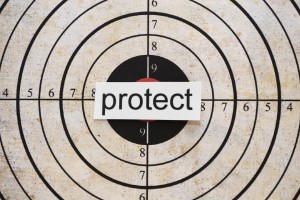How to Be Less Defensive: Lessons From a Wise Man
This post was originally published on December 22, 2015, and updated on June 11, 2019.
Most people have an ideal self-image—one that often comes from things we admire or dislike in our own parents. Other people can crush this ideal through their criticism and we are wired to protect and defend. This defensive side of us is only natural, but it has side effects: it increases conflict and reduces intimacy in relationships.
I know this all too well. As I’ve written before, I can be defensive in my work and personal life.
For example, a while back my wife Kari left me at home, unsupervised, with sole responsibility for our three children. The expectation was that, when she returned, they should each be ready to walk out the door for hockey practice.
I was exceedingly proud of my ability to feed them, dress them and entertain them. It was really great. Until Kari got home to calmly point out that they were missing socks and coats and that their bags were not in the car. Stress escalated as minutes passed while the kids protested and subverted our panicked efforts to get them going.
Although it’s not what she literally said, here’s how I interpreted Kari’s frustrated comments to me: “You know that image you have of yourself—that you’re a reliable and capable father—the way you see your own dad? Well, let it go. You do a few things well, but overall, you’re a failure.”
This shattering of my ideal self-image brings up a whole lot of fear, shame, and sadness. But of course admitting that makes me feel even more afraid, shameful and sad. So instead, I get protective and, in a raised voice, defend my record!

Finding Strength in Humility
Around this same time, we decided to begin regularly meeting with a marriage counselor, both together and separately. Our counselor helps us to understand and work on our emotional processes. He calmly listens, asks penetrating questions and slowly, with an economy of words, makes profound insights.
Let’s call him “Yoda.”
I’ve been intentionally applying his insights, and they are working. Much of my defensiveness has been replaced by humility, which ironically has made me stronger. Maybe some of his recent wisdom will be helpful to you too.
Combatting Your Defensive Nature
Here are the top lessons that “Yoda” has taught me about humility recently:
- Be curious rather than condemning. When my ideal self-image is threatened, my default response is either to criticize myself or to criticize the person, place or thing that is threatening my image. “Yoda” challenges me to resist the pull toward condemnation and move immediately to curiosity: What’s happening inside of me right now that’s making me so defensive? What’s going on with this other person that is making them frustrated with me? A posture of curiosity not only reduces a combative spirit, but it also leads to an important discovery about what is really happening.
- Recognize others’ feelings. “Yoda” reminds me that being on the defensive is a position of weakness. Trying to explain or justify ourselves is usually an act of desperation. Counter-intuitively, getting closer to the source of my threat makes me stronger. While role-playing this with me on the phone, “Yoda” demonstrated how I could have said, “I can see you’re really frustrated with me. I can’t imagine how aggravating it is to walk in the door and see that the kids weren’t ready like you thought they’d be. Naturally, that makes you angry.”Every ounce of my ego rolled its eyes at that demonstration. And every ounce of my head and heart was floored by the strength in those words.
- Find your true voice. “Yoda” says that problems arise when we lose our true voice. What he means is that there are things that are true about us that are hard to voice (fear, shame, sadness, embarrassment, etc.), and there are things that are false about us but easier to voice (anger, justification, criticism, etc.). As difficult as it is to find and speak our true voice (I’m scared right now because it feels like I’m not the father I want to be), this truth and vulnerability connect us to others. When we are false (Don’t get angry at me! I’m doing everything I can around here!), we defend—and disconnect.
Will you join me in being curious about defensive reactions, recognizing other’s feelings, and finding your true voice?









I’ll join you. Does it mean I get to meet Yoda?
Thank you, Jim! I can arrange for an introduction!
Amazingly written! I admire your courage to write about this in your blog as my wife and I are going through similar issues. I’ll join you. 🙂
Thank you, Kyle! I appreciate your comments and willingness to work on this.
I like the admission of the intrinsic first-reaction eye roll… but then the power that came out of it when you followed through. That can often be the way, can’t it?
I’m a big fan of Yoda myself.